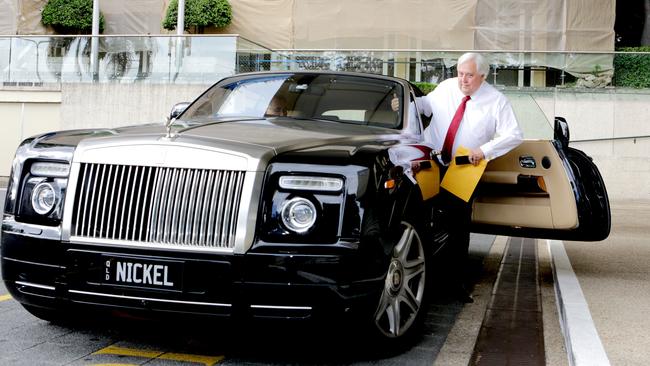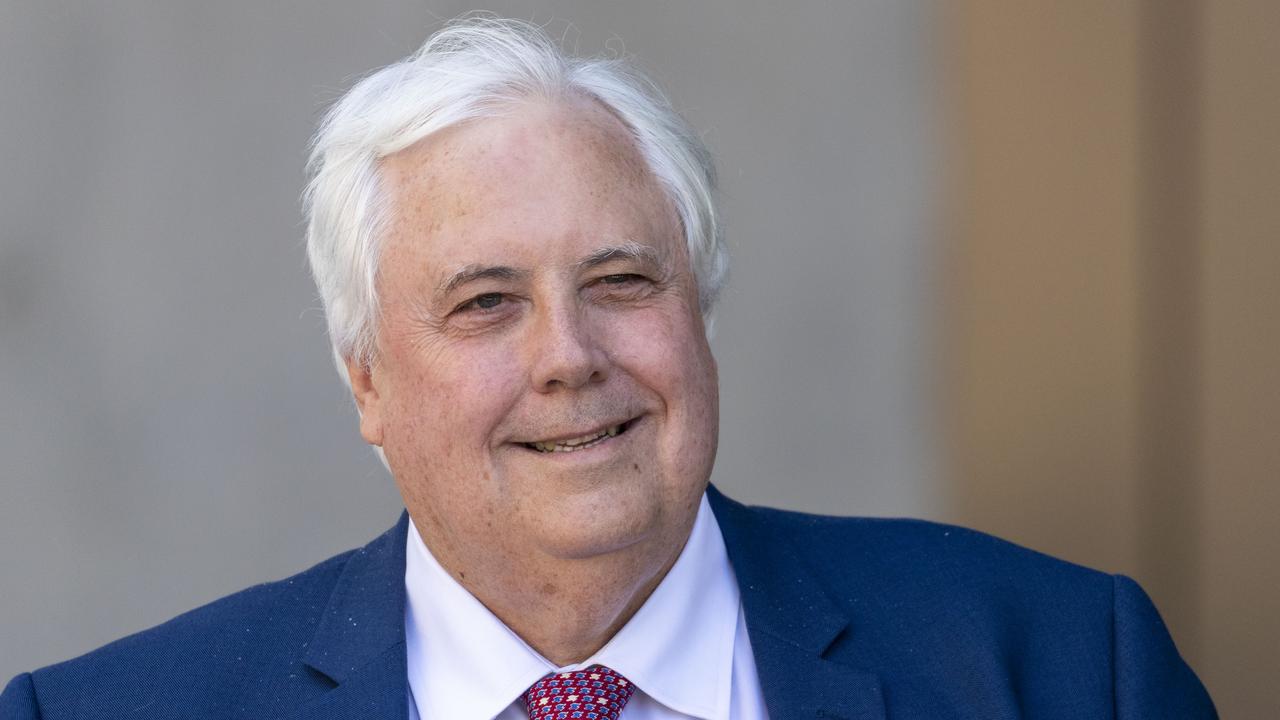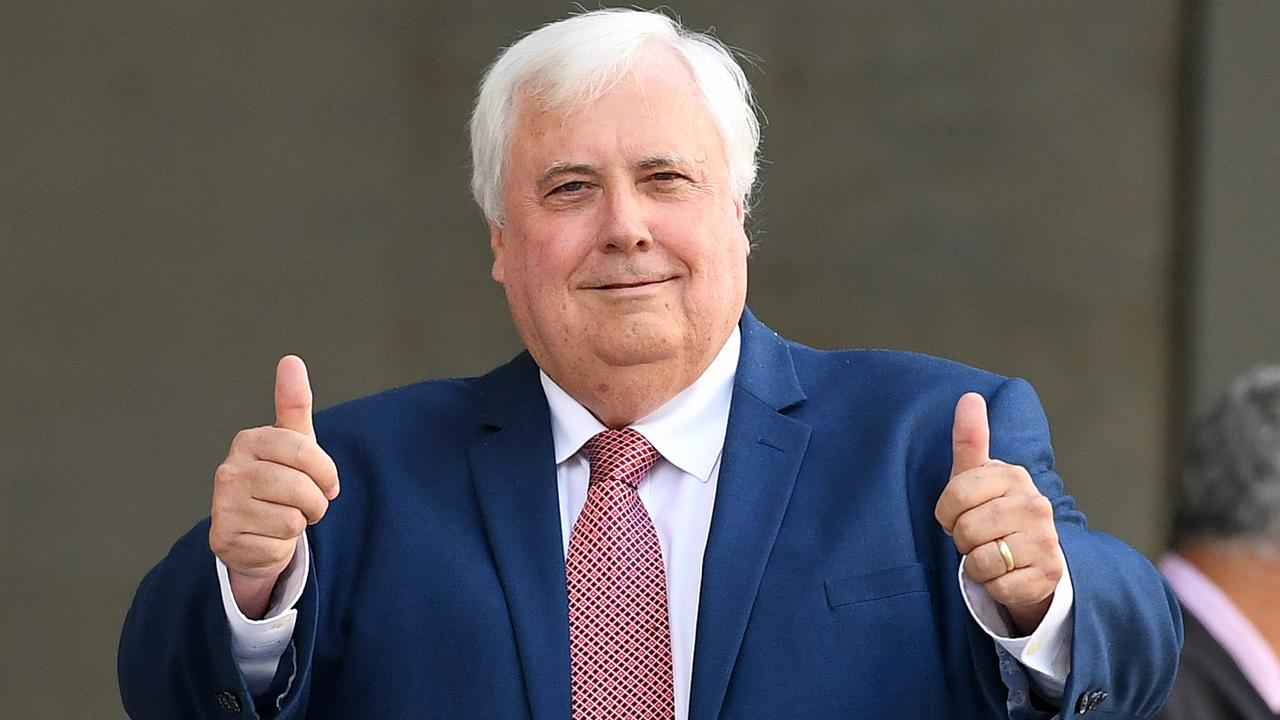Clive Palmer’s deal: back my project, I drop the lawsuit
CLIVE Palmer offered to drop all litigation against the Queensland government in return for favourable treatment for his proposed coal project.

CLIVE Palmer offered to drop all litigation and claims against the Queensland government in return for favourable treatment for his proposed $8.4 billion coal project in the state’s north as part of a “settlement” the government believes would have amounted to corruption if accepted.
The remarkable settlement document, released to The Australian yesterday by Deputy Premier Jeff Seeney, will be examined by the Crime and Misconduct Commission as part of an assessment of potential “official corruption” under the Criminal Code.
It is the latest salvo in an escalating fight in which Mr Palmer is accused of starting the Palmer United Party to wreak revenge after being rebuffed in attempts to “bribe” and “buy” Premier Campbell Newman’s government.
The document, which is headed “Settlement Terms” and refers to “Professor” Palmer and his private company Waratah Coal, was handed to the Deputy Premier’s chief of staff, Jeff Popp, by Mr Palmer in February last year, according to Mr Seeney.
Mr Seeney said yesterday that if he had agreed to the terms it would have been “corrupt”, adding that he repeatedly told Mr Palmer his demands were “completely ridiculous” but the tycoon “went off his brain”.
Mr Palmer, who has called Mr Seeney a “f . . king liar” and vowed to sue him for defamation, did not respond to questions from The Australian yesterday.
He launched defamation proceedings against Mr Newman last month.
Under the terms of the document, Waratah Coal would agree to “discontinue all current litigation” against the government and release the government from all claims Waratah had in relation to the China First Coal Project — an $8.4bn project involving coalmines, a 450km rail line and port operation in Queensland’s Galilee Basin.
In return, Mr Seeney and Mr Newman would have been required to bypass normal environmental and economic approval processes, effectively giving Mr Palmer’s project a golden rubber-stamp. The government was asked to “arrange for approval” of the Waratah rail corridor as an “infrastructure facility of significance”, and arrange to have its port facility on the central Queensland coastline granted similar status.
Waratah, which is wholly owned by Mr Palmer’s Mineralogy, also demanded an effective immunity for the company, Mr Palmer and their related parties from any “future offences” against the Criminal Code for three years.
The document required that the government not start “any litigation, judicial or administrative applications or to seek any orders or declarations from a court against Waratah, Professor Palmer and their respective associates, related parties, directors, officers and agents”.
And the government would not “rely upon any existing (and shall not introduce any) law, policy or other initiative without the consent of Waratah which would otherwise obstruct, hinder or delay the development of coal projects in the Galilee Basin or prejudice Waratah”.
The document was viewed by Mr Seeney as an audacious last-ditch bid by Mr Palmer to salvage a victory, after the Queensland government had infuriated the tycoon by giving exclusive rights to a rail corridor to the massive coal province to a consortium of GVK and Gina Rinehart’s Hancock Coal. “I said to him, ‘This is not the Bjelke-Petersen government and I’m not Russ Hinze’,” Mr Seeney said. “But you know Clive — he throws his hands in the air and he says, ‘Joh did this and that, and you’re denying Queenslanders 11,000 jobs’.
“It was his usual rant. I rejected all of his advances, repeatedly.
“The reason we have the Palmer United Party is because I rejected the terms in that document.
“PUP exists because we said no to him when it would have amounted to corruption if we had accepted his terms.”
At the time Mr Palmer, a significant donor to the Liberal National Party, was furious because his rail corridor and port plans had been rejected by the Queensland government, which favoured Mrs Rinehart’s proposal as a better deal for taxpayers.
The rebuff prompted Mr Palmer to bring a series of Supreme Court actions against Mr Seeney and Mr Newman to challenge the decision, while the resources tycoon also filed numerous Freedom of Information requests seeking thousands of documents from the government. He has since vowed to use his PUP to destroy the Newman government and repeatedly boasts it is “bye, bye” for Mr Newman.
Mr Palmer’s document, however, offered to “discontinue all current litigation” and “release the government from all current claims that Waratah has or might currently have” and withdraw all FoI requests.
In return for special treatment for his coal interests, Mr Palmer pledged his company would “provide all other current and future Galilee Basin project developers with third-party access to Waratah’s rail corridor on normal commercial terms”.
He also promised not to “disparage one another” in relation to settlement of the litigation that had already been launched by Mr Palmer in the Supreme Court.
His document also demanded that on execution of a “settlement deed”, the government would have six months to “use its best endeavours to have such agreement ratified by the parliament”.
The document required the government to grant Mr Palmer’s company a special exemption “to the proposed relinquishment of any of the tenements of the project”, and to ensure the granting by the Mines Department of further mining tenements”.
Mr Seeney said he regretted he had not provided the document to the CMC at the time: “It’s fair to say I spent a lot more time trying to work with Clive Palmer because of who he was and his role in the party. We were trying to … work with him.”




To join the conversation, please log in. Don't have an account? Register
Join the conversation, you are commenting as Logout